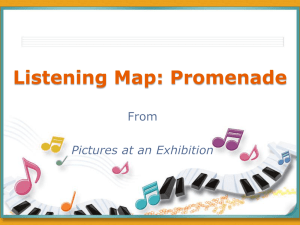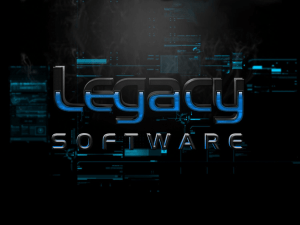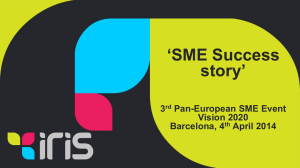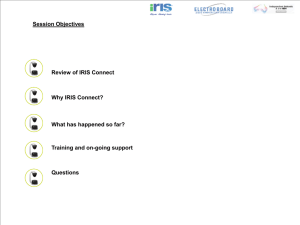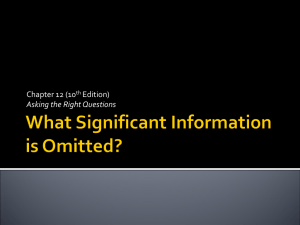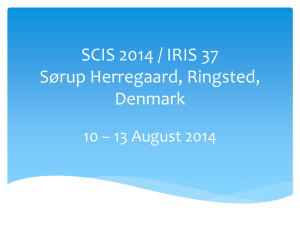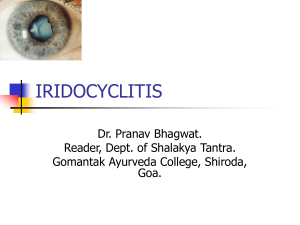IRIS: a new online resource for doing research into second
advertisement
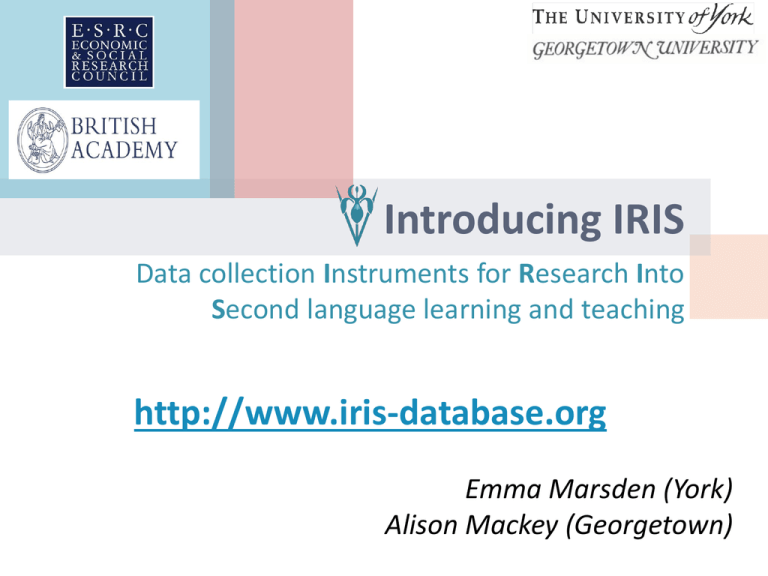
Introducing IRIS Data collection Instruments for Research Into Second language learning and teaching http://www.iris-database.org Emma Marsden (York) Alison Mackey (Georgetown) What is IRIS? Instruments for Research into Second Languages A sustainable, central digital repository Up- and downloadable; freely accessible Searchable across a wide range of parameters e.g. instrument type; research area; participant characteristics (incl. teachers, learners, trainees); L1; L2; language feature(s); proficiency Independent: Cross-institution, -country, -journal, -publisher, -funder Currently funded by ESRC & a long-term British Academy Research Project Sustainable infrastructure of University of York’s Digital Library Scope The scope of IRIS is as wide as the field of L2 research, including… L2 production Language learning L2 perception & identity … with diverse research aims Education & policy …in diverse contexts Phonology Grammar Vocabulary Pragmatics …with diverse types of data Language teaching Rationale behind IRIS Currently: Researchers create and keep own instruments (…re-invention of wheel, systematic research???) Maintenance and access to the instruments is ad hoc Usually brief descriptions with occasional short samples available in published work Contrast between: Complete data collection instruments vs. samples in appendix Submission online, or via email http://www.iris-database.org OR Email: iris@iris-database.org Criteria for upload: Instrument used to collect data published in a peer-reviewed: Journal article Book/chapter Conference proceedings Or an approved PhD thesis Usage to date August 2012: Fully live Over 900 downloads Over 4500 visits to site Over 150 data collection instruments Feedback features & quality assurance Downloaders can feedback about: further use of an instrument, new contextual information problems updated reliability statistics (generalisability) Uploader encouraged to allow on-line comments Or can request feedback to be sent personally to them Or refuse feedback Uploader informed when their instrument has been downloaded (citations; impact) Enhance transparency, evaluation and, eventually, quality Ethical issues...copyright Creative commons licensing Promoting: derivatives allowed; non-commercial; share-alike Awareness that instruments are often built on previous instrument IRIS team helps to pursue permission requests Acknowledgements are uploaders’ ultimate responsibility Support from potential users 1. 2. 3. 4. 5. 6. 7. 8. 9. Center for Applied Linguistics, US (Donna Christian, President) Committee for Linguistics in Education, UK (Graeme Trousdale, Chair) Early Language Learning in Europe (Janet Enever, Director) Higher Education Academy’s Subject Centre for Languages, Linguistics and Area Studies, UK (Mike Kelly, Director) International Association for Teachers of English as a Foreign Language (Herbert Puchta, President) Language Learning Journal (Norbert Pachler, Co-Editor) Modern Language Association’s Committee on Information Technology, US (Barbara Lafford) Research Special Interest Group of the International Association for Teachers of English as a Foreign Language (Anthony Bruton, Co-ordinator) UKOLN, Centre of Excellence in Digital Information Management (Michael Day, Research and Development Manager and Team Leader, UKOLN, University of Bath, UK) Support from research community Letters from journal editors Annual Review of Applied Linguistics (Charlene Polio, Editor-in-Chief) Bilingualism: Language and Cognition (Ping Li, Co-ordinating Editor) International Journal of Bilingualism (Li Wei, Editor) Journal of French Language Studies (Florence Myles, Chief Editor) Language Learning (Robert DeKeyser, outgoing Editor, and Lourdes Ortega, incoming Editor) Language Teaching (Graeme Porte, Editor) Language Teaching Research (Rod Ellis, Editor) Language Policy (Kendall King, Editor) Second Language Research (John Archibald, Co-Editor) Studies in Second Language Acquisition (Susan Gass, Associate Editor) System (Norman Davies, General Editor) Letters from presidents of professional research associations American Association for Applied Linguistics (AAAL) (Jeff Connor-Linton, President) British Association of Applied Linguistics (BAAL) (Susan Hunston, Acting Chair) European Second Language Association (EUROSLA) (Jean-Marc Dewaele, President) International Association for Applied Linguistics (AILA) (Martin Bygate, President) Language Learning and Teaching Special Interest Group (BAAL LLT SIG) (Suzanne Graham, Convenor) Linguistics Association of Great Britain (LAGB) (Kersti Börjars, President) The IRIS Advisory Board Michael Day (UKOLN Centre of Excellence in Digital Information Management, University of Bath, UK) Professor Rod Ellis (University of Auckland, New Zealand, and Cheung Kong Scholar Professor, Shanghai International Studies University, China) Professor Susan Gass (Michigan State University, US) Professor Jan Hulstijn (University of Amsterdam, Netherlands) Dr. Judith Klavans (University of Maryland Institute for Advanced Computer Studies, US) Professor David Martin (ESRC National Centre for Research Methods and ReStore Sustainable Web Resources Repository project, University of Southampton, UK) Professor Lourdes Ortega (Georgetown University, US) Professor Leah Roberts (University of York, UK) Professor Norman Segalowitz (Concordia University, Montréal, Canada) Professor Peter Skehan (Emeritus, Chinese University of Hong Kong, China) Instrument type: Motivation Questionnaire better understand the thoughts and beliefs of learners of English. This questionnaire consists of three sections. Please read each instruction and write your answers. This is not a test so there are no “right” or “wrong” answers and you do not even have to write your name on it. The results of this survey will be used only for research purpose so please give your answers sincerely. Thank you very much for your help! Instrument Part I In this part, we would like you to tell us how much you agree or disagree with the following statements by simply circling a number from 1 to 6. Please do not leave out any of items. Strongly disagree 1 Disagree 2 Slightly disagree 3 Slightly agree 4 Strongly agree 6 Agree 5 (Ex.) If you strongly agree with the following statement, write this: I like skiing very much. 1 2 3 4 5 6 1. I study English because close friends of mine think it is important. 1 2 3 4 5 6 2. My parents/family believe that I must study English to be an educated person. 1 2 3 4 5 6 3. Studying English can be important to me because I think it will someday be useful in getting a good job and/or making money. 1 2 3 4 5 6 4. I have to study English because I don’t want to get bad marks in it. 1 2 3 4 5 6 1 2 3 4 5 6 5. 6. Learning English is important to me because I would like to travel internationally. I think that there is a danger that Iranian people may forget the importance of Iranian culture, as a result of internationalisation. 1 2 available] 3 4 5 6 [Excerpt; Farsi version also 7. I would be happy if other cultures were more similar to Iranian. 1 2 3 4 5 6 8. I would like to spend lots of time studying English. 1 2 3 4 5 6 Research article 9. I can imagine myself speaking English as if I were a native speaker of English. 1 2 3 4 5 6 Taguchi, T., Magid, M., & Papi, M. (2009) 10. If I fail to learn English, I’ll be letting other people down. 1 2 3 4 5 6 The L2 motivational self tosystem Chinese, me in order toamong bring honours to my family. 11. Studying English is important 1Japanese 2 3 4 5 6and Studying English is important to me because English proficiency is necessary Iranian 12.learners of inEnglish: A comparative study1 2 3 4 5 6 for promotion the future. I have to learn English because without passing the English course I can not Instrument characteristics Research area Motivation Research question To test the “L2 Motivational Self System” (Dörnyei, 2005) on Japanese, Chinese and Iranian learners of English (especially with regard to the “ideal L2 self”, “integrativeness” and “instrumentality”) Data elicited by instrument After a correlational analysis After a structural equation modelling (SEM) analysis Conclusions The “L2 Motivational Self System” is not country specific “Integrativeness” can be relabelled the “ideal L2 self” Instrument type: Grammaticality Judgement Test Instrument Test 1 *Elle était plus courageux que son frère *J’ai revenu des vacances et j’ai repris mon travail Arc-en-Ciel était le plus beau poisson des océans. *La femme n’était pas belle mais elle était très intelligent. La fille est devenue de plus en plus belle. Je lui demande s’il est allé à l’école hier *Il vient de s’acheter une grand voiture. Une femme ambitieuse n’est jamais satisfaite. [Excerpt] Research article Erlam, R., & Loewen, S. (2010) Implicit and explicit recasts in L2 oral French interaction Instrument characteristics Research areas Morphosyntax Teaching methods Research question To examine the effectiveness of implicit and explicit corrective feedback Focus on noun–adjective agreement in American learners of French, which is difficult to acquire even after many years of exposure (Harley, 1989) Data elicited by instrument Participants had 1 hour of instruction with either explicit or implicit feedback Participants took the grammaticality judgement test (pre-test, post-test, delayed post test) Participants got 1 point for every sentence they (a) recognised as ungrammatical and (b) corrected (scores were reported as means) No difference was found between explicit and implicit feedback (Perhaps the implicit feedback was too salient because of the experimental setting?) References Taguchi, T., Magid, M., & Papi, M. (2009). The L2 motivational self system among Chinese, Japanese and Iranian learners of English: A comparative study. In Z. Dornyei & E. Ushioda (Eds.), Motivation, language identity and the L2 self (pp. 66-97). Multilingual Matters. Erlam, R., & Loewen, S. (2010). Implicit and explicit recasts in L2 oral French interaction. Canadian Modern Language Review, 66(6), 887-916. Finally... See www.iris-database.org for more information For help and support, e-mail: iris@iris-database.org Please help to raise awareness Upload an instrument Approx. 15 minutes, to make IRIS a sustained and integral part of our community’s practice Thanks too Julie Allinson (York Digital Library Manager) Frank Feng (IRIS systems developer) Julia Key (IRIS project assistant) Becky Taylor (IRIS research assistant) All the IRIS contributors to date (over 600 authors). Sample instruments (1) (Silver, 2000) Sample instruments (2) (Taylor, 2010) Sample instruments (3) (Garcia Mayo, 2002)

